Christof Lehmann (nsnbc) : The fifth African Union – European Union (AU – EU) summit took place on November 29 – 30, 2017 in Abidjan, capital of Ivory Coast. The summit brought together African and EU leaders to define the future direction for cooperation between the two continents. Joint statements are looking ahead, also in mitigating the outcome of previous failed policies. An analysis of policies that have led to disasters such as the war in Libya and the mass migration is not reflected in joint statements.
Together the delegates at the AU – EU summit adopted a joint declaration outlining common priorities for the EU-Africa partnership in four strategic areas including economic opportunities for youth, peace and security, mobility and migration, and cooperation on governance. EU President Donald Tusk, at the press conference of the AU-EU summit, 30 November 2017, said, among others:
“As you know, the European Union is Africa’s biggest partner and closest neighbor. Its biggest investor, its biggest trading partner, its biggest provider of development aid and humanitarian assistance as well as its biggest contributor in peace and security. And this summit demonstrated our determination to reinforce our partnership even more.”
Leaders also adopted a joint statement on the migrant situation in Libya, condemning the inhuman treatment of migrants and refugees by criminal groups. The statement does not focus on the role several leading EU and AU members played in destabilizing Libya during the so-called “Arab Spring” in 2011, or the African Union’s role in introducing to the continent a war that was widely understood as neo-colonialist. Instead, the joint statement focuses on cooperation in mitigating consequences. The statement does not reflect an analysis of the causes of the conflict nor does it reflect any tangible initiatives aimed to prevent similar catastrophes in the future.
At the summit, African and EU leaders focused on investing in youth. This is a key priority for Africa and the EU as 60% of the African population is under the age of 25. EU President Donald Tusk stressed the common desire to invest in youth in his opening remark at the summit:
“I would also especially like to welcome the African and European youth who are with us today. You represent a group that has worked hard in the last months. You rightly expect that we listen to you as we discuss priorities and actions for the next years, and that we include you in their implementation, because it is you who will take them forward in the future. Our task as leaders is to take decisions that will make the future safer and more prosperous for all of our youth, both African and European.”
The new EU external investment plan was presented to leaders on the occasion of the summit. This investment plan intends to trigger €44 billion investments in Africa by 2020, thereby creating new job opportunities for young people across the African continent. It should be noted that many of the initiatives and policies the EU supports with its external investment plan mirror the “pre-war-normal” in Libya before 2011. Free education, free health care, the right to a home, the right to work (or not to work) were understood as “normal” in Libya – previously the richest, most developed African country that was bombed back into subsistence by joint AU – EU efforts.
EU and African leaders agreed to support the mobility of students, staff and academics across the African continent. They also agreed to enhance exchange programmes between Africa and Europe, such as ERASMUS+. Regarding migration, leaders discussed how to tackle migrant smuggling and how to address jointly what they touted as the root causes of irregular migration.
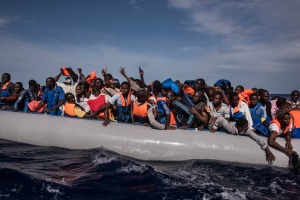 Regarding the situation in Libya, African and EU leaders committed to work together to end the inhuman treatment of migrants and refugees in this country. They adopted a joint statement calling for international cooperation to fight the perpetrator of such crimes, inside and outside Libya, and to bring them to justice. EU President Donald Tusk, at a press conference at the AU – EU summit, on November 30, 2017, said among others:
Regarding the situation in Libya, African and EU leaders committed to work together to end the inhuman treatment of migrants and refugees in this country. They adopted a joint statement calling for international cooperation to fight the perpetrator of such crimes, inside and outside Libya, and to bring them to justice. EU President Donald Tusk, at a press conference at the AU – EU summit, on November 30, 2017, said among others:
“Migration has a significant impact on both of our continents. So we have a joint responsibility to acknowledge it as an important part of our relationship, which requires that we act together. This is especially true when it comes to the situation in Libya with the most cynical abuse of human beings. Let me repeat my call to impose UN sanctions on human smugglers and traffickers. And let me also say that we will not be effective, if we do not ensure that the people caught up in Libya and elsewhere can return safely to their homes.”
In the margins of the summit, the EU agreed to establish a joint migration task force with the African Union and the UN. This task force will aim to save and protect lives of migrants and refugees, in particular in Libya, to accelerate assisted voluntary returns to countries of origin, and to speed up the resettlement of those in need of international protection. The summit also issued a Joint press release of the United Nations, the African Union and the European Union (European Commission) and the document Finding solutions to migratory pressures (background information).
Non of the joint statements reflect a discussion of the role France played in the overthrow of Ivorian President Lauren Gbagbo in 2010; The fact that Gbagbo and Libya’s Qaddafi were working toward the introduction of a gold-backed African currency. Non of the joint statements identifies the economically crippling role France plays by dominating the Economic and Monetary Union of West Africa UMEOA / UMEAO, the de-facto absolute control France exercises over west African economies and how France continues to harm African and European economies.
Even though the French economy would virtually collapse without the UMEOA, the EU is touting its own role as “the great contributor” while omitting the French CFA racket. The European Commission reports about the EU that “The EU and its member states are the number one contributor to promote development, stability and peace in Africa:
- €21 billion development aid was provided to Africa in 2016 by the EU and its member states, the largest aid donors on the continent
- €32 billion were invested in Africa by EU companies in 2015, accounting for around one third of the overall foreign direct investment in Africa
- €3.35 billion are allocated to the European fund for sustainable development, which should trigger up to €44 billion of investments
- 7 civilian and military missions are deployed across Africa
- €1.4 billion are committed to educational programmes in Africa from 2014 to 2020
The root causes for the lacking development of the western African economies are closely related to the fact that France, contrary to other former colonial powers, managed to install its commissars at the heart of its former colonies economic and monetary system and that it still maintains almost unchallenged control over them. The system was created by German National Socialists during the 1930s and 40s. It was used to usurp France and other German occupied nations.
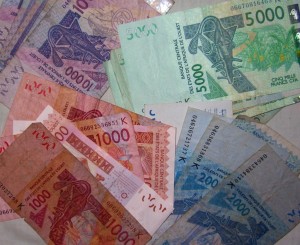
The CFA Franc and its “institutions” also lovingly described as currency for French Finance Nazism in Africa, or as “Financial Anachronism”.
Together, Benin, Burkina Faso, Cameroon, Central African Republic, Chad, Equatorial Guinea, Ivory Coast, Gabon, Guinea Bissau, Mali, Niger, the Republic of Congo, Senegal and Togo, establish the Monetary and Economic Union of West Africa (U.M.E.O.A. / UMEAO. Their currency, the CFA-Franc is printed under supervision of the French National Bank in Charmaliéres, France.
The Council of Presidents of the fifteen U.M.E.O.A. member states constitutes the highest authority of the union. Decisions of the Presidential Council are made unanimously. The Ministerial Council of the U.M.E.O.A. defines the monetary and credit policy of the union and it is responsible for the economic development of the region.
According to the constitutions of all fifteen member states the creation of their currency, the regulation of its value as well as the regulation of parities and modalities is the exclusive privilege of the nation and its people and decisions about it are made by the parliament.
The placement of French commissars within the heart of the nations and the union`s banking system however, creates an obvious dichotomy between the apparent sovereignty of the union, its constituents, and direct control from the previous colonial power.
Three of the thirteen of the Directors of the B.E.A.C. are French and four of the eight Directors of the B.C.C. are French. The Board of Directors of the B.C.E.A.O. is constituted by sixteen Directors; two from each country plus two additional Directors from France who take part in the management of the bank under the same conditions and with the same privileges as the other Directors. The number and placement of the commissars gives them a Veto right at the board of each of the Central Banks. No decision can be made without their approval and France can enforce its policy by threatening to deadlock the economies unless decisions are made in compliance with French suggestions.
The French Veto right also extends to the nomination of the Governor of the B.E.A.C.. The Governor is elected with the unanimous vote of the Board of Directors, on suggestion of the government of Gabon, and after the approval of the other member states as well as France.
The Central Bank does not only have the privilege to create the currency. It also has the privilege to grant credit for the current accounts of the national treasuries at its discount rate. The Board of Directors is making the decisions about the temporalities and about the total amount that is granted for financing the economies of each of the member states.
The foreign currency reserves are subject to deposition in an operations account at the French National Bank. Between 1945 and 1973 one hundred per cent of the foreign currency reserves had to be deposited in the operations account, in 1973 it was reduced to sixty-five, and on 27. September 2005 to fifty percent. Another fifteen percent is kept in a guaranty fund.
In other words sixty-five per cent of all foreign currency reserves of the fifteen nations and all revenue generated outside of the unions territory is kept at the French National Bank. On 3 Mai 2010 the website of Jeune Afrique quotes the former French Minister of Finance and Commerce, Christine Lagarde: “The Bank of the States of Central Africa, for instance, places an almost 90 per cent of their reserves in the French National Bank”.
In 1960 Jean Boissonat, a member of the currency committee of the French National Bank wrote: “Almost all decisions were made in France .. The Franc Zone allowed France to deliver certain natural resources to itself without having to spend any foreign reserves. It was estimated that this represented two hundred and fifty million US-Dollar savings in terms of foreign reserves per year …” Boissonat continues by stating that approximately half a million Frenchmen in Paris receive their means of survival from the Franc Zone.
The French socialist Jean-Noël Jeanny wrote in 1963 that: “all that the African nations achieve by increasing their export is the generation of more foreign currency reserves for France”. He could as well have added “and the creation of debt for themselves”. Beside profiting on African foreign currency reserves which are returned to the West African nations in the form of debt, France is also profiting from African gold.
The gold reserves of the fifteen nations are kept in France, supposedly to guaranty for the value of the CFR Franc. In 2001 the West-African gold reserves at the French National Bank had an estimated value of 206,528 billion CFR Franc. In an interview for Le Liberation in 1996 the late President of Gabon, Omar Bongo said: “We are in the Franc Zone. Our operations accounts are managed by the French National Bank in Paris. Who profits from the interests that our money generates ? France.”
France is indebting and enslaving Africans by means of Africa’s own wealth; for example: 12.0000 billion invested at three per cent creates 360 billion in interests which France grants as credits to Africa at an interest rate of five to six per cent or more. The allegory of “Bleeding Africa and Feeding France” is no exaggeration, not alarmist, and not revolutionary. It is a sobering fact of French modo-colonialism and the cost in terms of under-development and human suffering is staggering.
The current accounts and the French usurpation are a humanitarian disaster that is induced by France and financed by those who are suffering from it. A growing number of parties and organizations in EU member states have recognized that the role France plays will eventually backfire and harm African and European economies, cooperation and development. However, the outcome of the 5th AU – EU summit shows that the “moderates” who seek true cooperation instead of “usurpation and mitigation” still are in the minority in the EU and – ironically, in the African Union as well.
CH/L – nsnbc 01.12.2017
Recommended reading:
Neo-Colonialism, Subversion in Africa and Global Conflict
The CFA Franc: Africa’s financial anachronism
French Africa Policy Damages African and European Economies.
Source Article from https://nsnbc.me/2017/12/01/87266/
 RSS Feed
RSS Feed















 December 2nd, 2017
December 2nd, 2017  Awake Goy
Awake Goy 










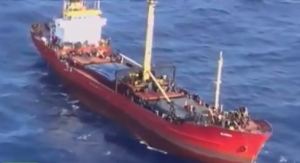
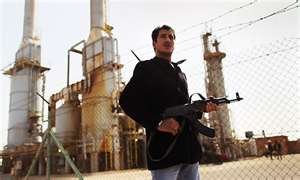
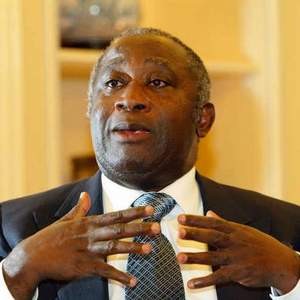
 Posted in
Posted in  Tags:
Tags: 













